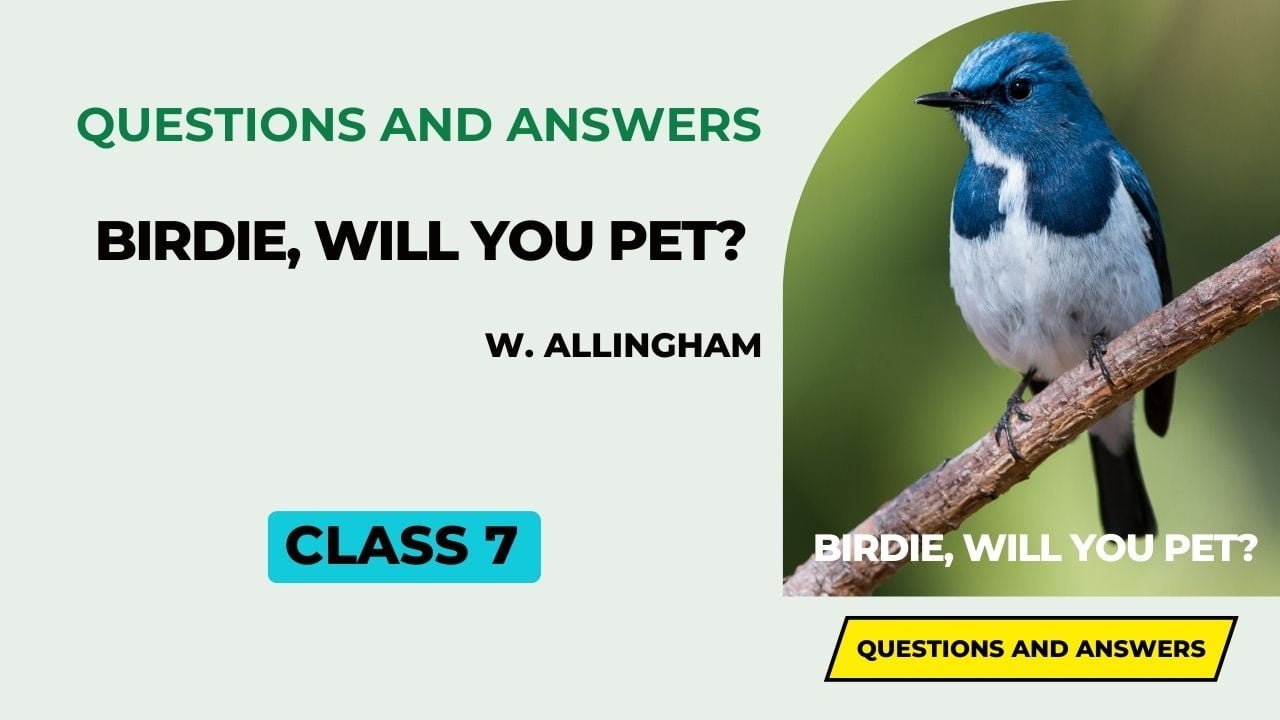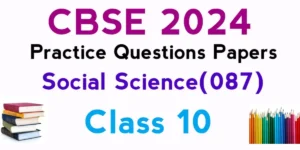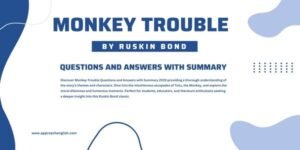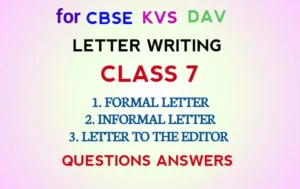Birdie Will You Pet by W. Allingham Questions and Answers” provides Class 7 DAV students (2024-2025) with an in-depth understanding of the poem’s key themes and character interactions. This resource helps students explore the contrast between material comforts and natural freedom as depicted in the poem.
Summary of Birdie Will You Pet:
In this poem, a child offers various luxurious items to entice a bird to stay and be their pet. Despite the lavish promises of a velvet bed, a satin pillow, a necklace of jewels, and other extravagant gifts, the bird declines. The bird prefers its natural home and simple pleasures: sleeping in the ivy, drinking from running water, perching on twigs, and flying freely. The bird values its freedom and natural lifestyle over material wealth, ultimately bidding farewell to the child.
Pre-reading Task
1. If asked to choose between money and freedom, what would you choose and why?
Ans: I would choose freedom because it allows me to live my life on my own terms, make my own choices, and pursue my happiness without restrictions. While money can provide comfort and security, it cannot replace the value of being free to do what I love and live authentically. Freedom enables me to explore my passions, express myself, and experience life fully.
2. Can you think of a few things that come with freedom and cannot be bought with money? Discuss with your partner and prepare a list.
Ans:
Here are a few things that come with freedom and cannot be bought with money:
- Happiness: True happiness often comes from personal fulfillment and the freedom to pursue our passions and dreams.
- Peace of Mind: The freedom to live without undue stress and pressure brings peace of mind.
- Creativity: The freedom to think and express oneself creatively cannot be bought.
- Personal Growth: The freedom to learn, grow, and develop as a person is invaluable.
- Relationships: Genuine connections and relationships are built on mutual respect and freedom.
- Health: Freedom to make healthy lifestyle choices contributes to overall well-being.
- Adventure: The freedom to explore, travel, and experience new things adds richness to life.
- Autonomy: The ability to make decisions for oneself is a key aspect of freedom.
- Integrity: The freedom to live by one’s values and principles is priceless.
I Understanding the Poem, Birdie Will You Pet
A. In the poem, the child offers various comforts to the bird in exchange for its freedom, but the bird declines them. Complete the chart given below by filling in the offers made by the child and the bird’s preference over them.
| The child offers: | The bird prefers: |
| (a) Silken quilts (b) A velvet bed and a satin pillow | (a) Sleeping in the ivy wall (b) No rain coming through and hearing it fall |
| (c) A necklace made of diamond-stones, amber, and jet | (c) Singing and flying away at dawn |
| (d) A dish of silver fret (e) A golden cup (f) An ivory seat (g) Carpets soft beneath the bird’s feet | (d) A feather necklace (e) Drinking from running water (f) A rocking twig as the finest chair (g) The softest paths through the air |
B. Read the extracts given below from Birdie Will You Petand answer the questions that follow.
(a) I’d rather sleep in the ivy wall;
No rain comes through, tho’ I hear it fall.
The sun peeps gay at dawn of day.
And I sing, and wing away, away!
(i) Who is ‘I’ in the above lines?
Ans: The bird is ‘I’ in the above lines.
(ii) Ivy is a plant. What does the bird want to convey by describing it as a wall?
Ans: By describing the ivy as a wall, the bird conveys that the ivy provides shelter and protection, much like a wall would.
(iii) What does the speaker prefer ivy wall to?
Ans: The speaker, the bird, prefers the ivy wall to the silken quilts, velvet bed, and satin pillow offered by the child.
(b) A feather necklace round and round,
That I wouldn’t sell for a thousand pound!
(i) What is the necklace offered by the child made of?
Ans: The necklace offered by the child is made of diamond-stones, amber, and jet.
(ii) What is the necklace that the bird has made of?
Ans: The necklace that the bird has is made of feathers.
(ii) Which necklace does the bird prefer? Why?
Ans: The bird prefers the feather necklace because it is natural and represents the bird’s freedom and identity. The bird values its natural lifestyle over material wealth.
C. What is the rhyme scheme of the poem,Birdie Will You Pet?
Ans: The rhyme scheme of the poem is AABB.
D. Pick out at least three examples of alliteration from the poem.
Ans:
(a) Stanza 2: “peeps gay”
(b) Stanza 2: “dawn of day”
(c) Stanza 3: “feather necklace”
II HOTS
Why does the bird refuse to accept the various comforts offered by the child? Discuss.
Ans: The bird refuses to accept the various comforts offered by the child because it values its freedom and natural lifestyle over material possessions. The bird finds joy in simple, natural pleasures such as sleeping in the ivy, singing at dawn, and flying freely. The luxuries offered by the child, although tempting, cannot replace the bird’s sense of freedom and connection to nature.
III Life Skills
Is freedom just the right to live as we wish?
Ans: Freedom is not just the right to live as we wish; it also encompasses the ability to make choices, take responsibility for those choices, and live without undue restrictions or constraints. It includes the right to pursue one’s own happiness and well-being, as well as the respect for others’ rights and freedoms. True freedom involves a balance between individual desires and social responsibilities.
IV Values
Why does the child call the bird ‘birdie’? Why does the child use the word ‘birdie’ twice?
Ans: The child calls the bird ‘birdie’ as a term of endearment, expressing affection and a desire to form a bond with the bird. By using the word ‘birdie’ twice, the child emphasizes this affection and eagerness to connect, hoping to persuade the bird to stay with them.
V Writing Skills
The child in the poem realises that the bird cannot be lured. She has her own priorities in life. Freedom is equally important to her. The child decides to share the conversation between her and the bird with her friend through a letter. Write the letter in not more than 120 words.
Ans:
Dear [Friend’s Name],
I had the most interesting conversation with a little bird today. I tried to entice it to stay with me by offering luxurious things like silken quilts, a velvet bed, and even a necklace of diamonds, amber, and jet. Despite all these temptations, the bird preferred its simple life in the ivy, its feather necklace, and the freedom to fly wherever it wished. It made me realize how important freedom is, even for a small bird. The bird values its natural home and independence over any material comfort I could offer. It was a beautiful reminder that sometimes, the simple things in life and our freedom are the most precious.
Best,
[Your Name]
Extra Questions Answers from Birdie Will You Pet
1: Why do you think the bird values its feather necklace more than a necklace of diamonds, amber, and jet? (HOTS)
Answer: The bird values its feather necklace more because it represents its natural identity and freedom. The feather necklace is part of its own body and lifestyle, symbolizing the bird’s connection to nature. Unlike material wealth, which can be alluring but also restrictive, the feather necklace is a simple, intrinsic part of the bird’s existence, making it irreplaceable and priceless.
2: What lesson can we learn from the bird’s preference for natural comforts over luxurious offers? (HOTS)
Answer: We can learn that true happiness and contentment often come from appreciating and valuing the simple, natural things in life rather than seeking material possessions. The bird teaches us that freedom, nature, and being true to oneself are more fulfilling than external luxuries. It reminds us to find joy in what we already have and to cherish our independence and natural surroundings.
3: How does the bird’s response to the child’s offers demonstrate decision-making skills? (Life Skills)
Answer: The bird’s response shows effective decision-making skills by carefully considering the child’s offers and choosing what aligns best with its needs and values. Despite the temptations of luxurious items, the bird stays true to its preference for freedom and natural living, demonstrating the importance of making choices that reflect personal values and long-term happiness rather than immediate gratification.
4: What can we learn about the importance of knowing one’s priorities from the bird’s refusal of the child’s offers? (Life Skills)
Answer: We learn that understanding and sticking to one’s priorities is crucial for maintaining personal happiness and well-being. The bird’s refusal highlights that knowing what truly matters to us—such as freedom, comfort in nature, and authenticity—helps us make decisions that are best for our lives. It teaches us to prioritize our values and intrinsic needs over external temptations and pressures.
5: Why is it important to respect the bird’s choice to remain free, and how can we apply this understanding to our interactions with others? (Values-based Questions)
Answer: It is important to respect the bird’s choice to remain free because it highlights the value of respecting individual autonomy and preferences. We can apply this understanding to our interactions with others by recognizing and honoring their choices and needs, even if they differ from our own. This respect fosters mutual understanding and appreciation for each person’s unique perspective and values.
6: How does the child’s repeated attempts to entice the bird reflect human nature, and what can we learn about respecting nature from the bird’s responses?(Values-based Questions)
Answer: The child’s repeated attempts to entice the bird reflect human nature’s tendency to control or possess what we find beautiful or valuable. The bird’s responses teach us to respect nature and its creatures by appreciating them in their natural state rather than trying to alter or confine them for our own satisfaction. We learn that true respect for nature involves allowing it to thrive freely and understanding the intrinsic worth of all living beings in their natural environments.
Extra extract-based questions and answers based on the poem Birdie Will You Pet
Extract 1:
“I’d rather sleep in the ivy wall;
No rain comes through, tho’ I hear it fall.
The sun peeps gay at dawn of day,
And I sing, and wing away, away!”
Q: Who is the speaker in these lines?
Ans: The speaker in these lines is the bird.
Q: What does the bird mean by “No rain comes through, tho’ I hear it fall”?
Ans: The bird means that while it can hear the rain falling outside, it remains dry and protected in its cozy spot in the ivy.
Q: What does the bird prefer to do at dawn?
Ans: The bird prefers to sing and fly away at dawn.
Extract 2:
“A feather necklace round and round,
That I wouldn’t sell for a thousand pound!”
Q: What is the bird’s necklace made of?
Ans: The bird’s necklace is made of feathers.
Q: Why does the bird value its feather necklace so highly?
Ans: The bird values its feather necklace highly because it is natural and part of its own body, symbolizing its freedom and identity.
Extract 3:
“Can running water be drunk from gold?
Can a silver dish the forest hold?
A rocking twig is the finest chair,
And the softest paths lie through the air-
Good-bye, good-bye to my lady fair!”
Q: What is the bird implying by asking if running water can be drunk from gold or if a silver dish can hold the forest?
Ans: The bird is implying that natural things cannot be replaced by material luxuries. It prefers natural elements like running water and the forest over gold and silver objects.
Q: What does the bird consider to be the finest chair?
Ans: The bird considers a rocking twig to be the finest chair.
Q: What does the bird prefer as paths to travel?
Ans: The bird prefers the soft paths through the air to travel.
Extract 4:
“O Birdie, Birdie, will you pet?
Diamond-stones and amber and jet
We’ll string on a necklace fair and fine.
To please this pretty bird of mine!”
Q: What is the child offering the bird in this extract?
Ans: The child is offering the bird a necklace made of diamond-stones, amber, and jet.
Q: Why does the child offer the bird a necklace made of precious stones?
Ans: The child offers the bird a necklace made of precious stones to try to entice the bird to stay and become its pet.
Extract 5:
“O Birdie, Birdie, won’t you pet?
We’ll buy you a dish of silver fret,
A golden cup and an ivory seat,
And carpets soft beneath your feet!”
Q: What additional luxuries does the child offer the bird in this extract?
Ans: The child offers the bird a dish of silver fret, a golden cup, an ivory seat, and soft carpets to walk on.
Q: How does the bird respond to these offers?
Ans: The bird declines these offers, preferring its natural environment and freedom over material luxuries.
Extract 6:
“I’d rather sleep in the ivy wall;
No rain comes through, tho’ I hear it fall.
The sun peeps gay at dawn of day,
And I sing, and wing away, away!”
Q: Why does the bird prefer to sleep in the ivy wall?
Ans: The bird prefers to sleep in the ivy wall because it provides natural protection from the rain, allows it to enjoy the sunlight at dawn, and lets it live freely.
Q: What does the bird’s preference for the ivy wall tell us about its character?
Ans: The bird’s preference for the ivy wall shows that it values simplicity, nature, and freedom over material comforts.







